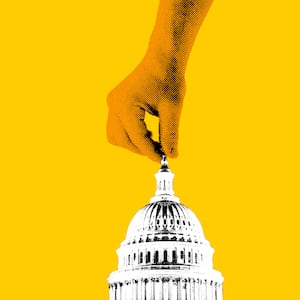It’s time for American voters to accept that the rematch six in ten Americans didn’t want is happening: Trump vs. Biden.
On the heels of Super Tuesday and Nikki Haley’s departure from the 2024 presidential race, Donald Trump is poised to officially be the GOP nominee for president—despite 91 felony counts, four separate indictments, and being found liable for sexual assault.
In poll after poll, most recently a New York Times/Siena College poll, Trump dominates Joe Biden head-to-head, as well as with key demographics. But those polls seem to be missing a flashing red warning sign for Trump in a general election: his disapproval with Republican voters.
Haley’s quixotic race for the GOP nomination exposed Trump’s flawed and weakened standing within the Republican Party, but more broadly with the American electorate. A new Associated Press survey found that two in ten Iowa primary voters, a third of New Hampshire Primary voters, and a quarter of South Carolina Republican voters would refuse to vote for Trump in the fall.
A CNN exit poll of Virginia primary voters found that among Nikki Haley voters, 78 percent would not commit to voting for the Republican nominee in November. In California, 69 percent of Haley voters said they wouldn’t vote for Trump in November, according to an NBC News exit poll. Even more striking were exit polls out of North Carolina that found 81 percent of Haley voters would not commit to voting for the eventual GOP nominee.
These numbers are remarkable if you consider that GOP primary voters are historically among the most intense of voters—meaning they will turn out and skew strongly more to the right than the average general election voter.
New Hampshire has an open primary, and a significant percentage of Democrats and independents turned out to vote for Haley. However, in South Carolina only four percent of Haley voters were Democrats, the majority of her roughly 30 percent came from Republicans and independents.
Donald Trump remains the dominant force in Republican politics. But that does not necessarily equate to being able to win in November.
Trump is essentially running as an incumbent, for all intents and purposes. Trump has near universal name identification as a former president. He has the tacit (if not direct support) of the entire Republican Party apparatus behind him, including the outgoing RNC chairwoman. He’s endorsed by the majority of elected Republican officials and has the support of the vast majority of right-wing media.
Joe Biden beat Trump in 2020 in large part thanks to outperforming Trump with independents and a small number of moderate Republican crossover voters, namely in suburban areas. To believe that Trump is better positioned to beat Joe Biden in 2024 would require you to believe that Trump has more independent and moderate support AFTER the Jan. 6 insurrection and following 91 felony counts than he did before they came down.
Trump’s vulnerabilities are very real, but so are Joe Biden’s. If the presidential election were held today, based on all the data we have, Trump would likely narrowly defeat Biden. This race will come down to who has the better messaging and turnout operation in seven to eight swing states—and will be decided in each by roughly half a million voters.
While Democrats have hoped to run on reproductive rights, the latest polling shows abortion outside of the top three issues to voters, with the chief issue for voters left, right, and center being border security. On border security, Trump outperforms Biden nearly two to one.
The takeaway: neither campaign should be resting easy.
We may yet see a scenario where Trump loses the popular vote by the largest margin in modern history, but still wins the presidency. There are simply more Americans who do not want Trump than want Trump.
However, there are also many Americans who very well may choose to stay on the couch rather than get out and vote for an unpopular Joe Biden. The question remains: who can turn out the independents and moderates needed to sway the election. At the moment, it seems they are Biden’s to lose.









